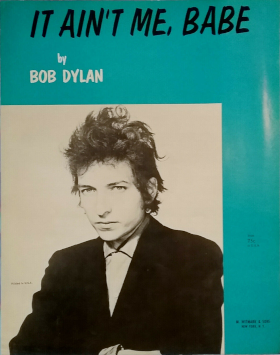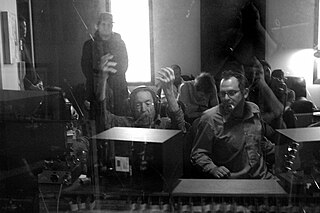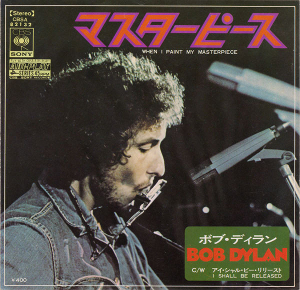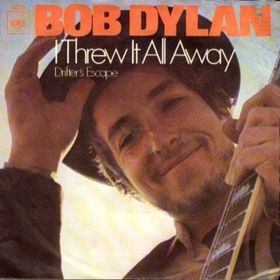
"A Boy Named Sue" is a song written by Shel Silverstein and made famous by Johnny Cash. Cash recorded the song live in concert on February 24, 1969, at California's San Quentin State Prison for his At San Quentin album. Cash also performed the song in December 1969 at Madison Square Garden. The live San Quentin version of the song became Cash's biggest hit on the Billboard Hot 100 chart and his only top ten single there, spending three weeks at No. 2 in 1969, held out of the top spot by "Honky Tonk Women" by The Rolling Stones. The track also topped the Billboard Hot Country Songs and Easy Listening charts that same year and was certified Gold on August 14, 1969, by the RIAA.

"It Ain't Me Babe" is a song by Bob Dylan that originally appeared on his fourth album Another Side of Bob Dylan, which was released in 1964 by Columbia Records. According to music critic Oliver Trager, this song, along with others on the album, marked a departure for Dylan as he began to explore the possibilities of language and deeper levels of the human experience. Within a year of its release, the song was picked up as a single by folk rock act the Turtles and country artist Johnny Cash. Jan & Dean also covered the track on their Folk 'n Roll LP in 1965.

The Firstborn Is Dead is the second studio album by the post-punk band Nick Cave and the Bad Seeds, released on 3 June 1985. Produced by the band and Flood, the album saw singer Nick Cave continue his fascination with the American South, featuring references to Elvis Presley and bluesmen like Blind Lemon Jefferson. The album was recorded in the Hansa Studios in Berlin, Germany. Cave later said of the album, "Berlin gave us the freedom and encouragement to do whatever we wanted. We'd lived in London for three years and it seemed that if you stuck your head out of the box, people were pretty quick to knock it back in. Particularly if you were Australian. When we came to Berlin it was the opposite. People saw us as some kind of force rather than a kind of whacky novelty act."
"Long Black Veil" is a 1959 country ballad, written by Danny Dill and Marijohn Wilkin and originally recorded by Lefty Frizzell.

Johnny Cash at San Quentin is the 31st overall album and second live album by American singer-songwriter Johnny Cash, recorded live at San Quentin State Prison on February 24, 1969, and released on June 16 of that same year. The concert was filmed by Granada Television, produced and directed by Michael Darlow. The album was the second in Cash's conceptual series of live prison albums that also included At Folsom Prison (1968), På Österåker (1973), and A Concert Behind Prison Walls (1976).

"Lay Lady Lay", sometimes rendered "Lay, Lady, Lay", is a song written by Bob Dylan and originally released in 1969 on his Nashville Skyline album. Like many of the tracks on the album, Dylan sings the song in a low croon, rather than in the high nasal singing style associated with his earlier recordings. The song has become a standard and has been covered by numerous bands and artists over the years.

"All I Really Want to Do" is a song written by Bob Dylan and featured on his Tom Wilson-produced 1964 album, Another Side of Bob Dylan. It is arguably one of the most popular songs that Dylan wrote in the period immediately after he abandoned topical songwriting. Within a year of its release on Another Side of Bob Dylan, it had also become one of Dylan's most familiar songs to pop and rock audiences, due to hit cover versions by Cher and the Byrds.

Donald William "Bob" Johnston was an American record producer, best known for his work with Bob Dylan, Johnny Cash, Leonard Cohen, and Simon & Garfunkel.

"Highway 61 Revisited" is the title track of Bob Dylan's 1965 album Highway 61 Revisited. It was also released as the B-side to the single "Can You Please Crawl Out Your Window?" later the same year. In 2004, Rolling Stone magazine ranked the song as number 364 in their 500 Greatest Songs of All Time.

Orange Blossom Special is the 21st album released by musician Johnny Cash on Columbia Records in 1965. The recordings include country and folk standards, such as "The Long Black Veil", "When It's Springtime in Alaska", "Danny Boy" and "Wildwood Flower".

Little Fauss and Big Halsy is a soundtrack album to the 1970 film of the same name. Released on Columbia Records the same year, it features primarily songs by country singer Johnny Cash. The album includes tracks written by Cash, Carl Perkins and Bob Dylan, as well as several tracks performed by Perkins, but did not chart.

"The Mercy Seat" is a song written by Nick Cave and Mick Harvey (music), originally performed by Nick Cave and the Bad Seeds on the 1988 album Tender Prey. The song has been covered by others, including Johnny Cash, Camille O'Sullivan and Unter Null. Rolling Stone editor Toby Creswell lists it as one of the 1001 greatest songs.

"I Shall Be Released" is a 1967 song written by Bob Dylan.
"Girl from the North Country" is a song written by Bob Dylan. It was recorded at Columbia Recording Studios in New York City in April 1963, and released the following month as the second track on Dylan's second studio album, The Freewheelin' Bob Dylan. Dylan re-recorded the song as a duet with Johnny Cash in February 1969. That recording became the opening track on Nashville Skyline, Dylan's ninth studio album.

"Tonight I'll Be Staying Here with You" is a song written by Bob Dylan from his 1969 album Nashville Skyline. It was the closing song of the album. The song was the third single released from the album, after "I Threw It All Away" and "Lay Lady Lay", reaching #50 on the US Billboard Hot 100 chart, and reaching the top 20 in other countries. It was anthologized on the compilation albums Bob Dylan's Greatest Hits Vol. II and Playlist: The Very Best of Bob Dylan '60s.

"George Jackson" is a song by Bob Dylan, written in 1971, in tribute to the Black Panther leader George Jackson, who had been shot and killed by guards at San Quentin Prison during an attempted escape on August 21, 1971. The event indirectly provoked the Attica Prison riot.

"Big River" is a song written and originally recorded by Johnny Cash. Released as a single by Sun Records in 1958, it went as high as #4 on the Billboard country music charts and stayed on the charts for 14 weeks. The song tells a story of the chase of a lost love along the course of Mississippi River from Saint Paul, Minnesota to New Orleans, Louisiana.

"I Threw It All Away" is a song by American singer-songwriter Bob Dylan. The track appeared on Dylan's album Nashville Skyline in 1969, and was released as its first single later that year, where it reached number 85 on the Billboard Hot 100, and number 30 on the UK Singles Chart. It is considered to be one of the best and most popular songs on the album.

Preflyte is a compilation album by the American folk rock band the Byrds and was released in July 1969 on Together Records. The album is a collection of demos recorded by the Byrds at World Pacific Studios in Los Angeles during late 1964, before the band had signed to Columbia Records and become famous. It includes early demo versions of the songs "Here Without You", "You Won't Have to Cry", "I Knew I'd Want You", and "Mr. Tambourine Man", all of which appeared in re-recorded form on the band's 1965 debut album.
"I Still Miss Someone" is a song co-written by Johnny Cash and his nephew Roy Cash, Jr. and originally recorded by American country music singer Johnny Cash. He first recorded it in 1958 as the B-side to "Don't Take Your Guns to Town".

















